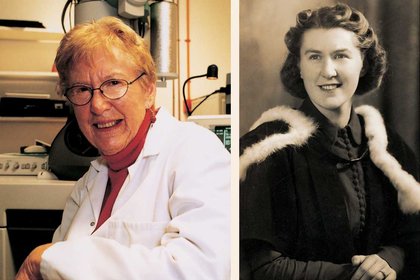
Paddy Bassett
Paddy Bassett, the first woman to graduate from Massey with a Bachelor of Agricultural Science, died on July 20, 2019.
Born Elsie Gertrude Thorpe in Timaru in 1918, her father’s profession as a vicar meant she lived in a number of places before she attended Craighead Diocesan School in Timaru. She had a lifelong interest in animals. Two of her siblings were farmers and she recalled she “often spent school holidays” on their farms where she learned “how to milk cows, how to build a haystack and harrow a paddock”.
Although she did not study science at school, her father encouraged her to study agricultural science. With Lincoln University then closed to female students, and veterinary studies requiring a move to Sydney, which was too expensive, Dr Bassett and her sister Mary enrolled at Canterbury University in 1936. She was not successful in her first year, but passed all her papers the following year and, because of her affinity for animals, enrolled in a Bachelor of Agriculture at Massey Agricultural College (as it was then called) in 1938, graduating in 1941.
She “participated fully in all areas of Massey life” and her scholarly aptitude soon became apparent. During her vacations, Massey historian Lesley Courtney noted “she assisted sheep husbandry lecturer Ted Clarke in his research”. She went on to have a distinguished research career. After graduating from Massey, she completed a master’s degree at Lincoln where she met Colin Bassett, whom she married in 1943.
She worked at Ruakura Animal Research Station, Hamilton for some years, then travelled to Cambridge, England, to study for a PhD, graduating in 1957. The Bassetts then moved to Dunedin, where Paddy worked as a researcher at Otago Medical School. Retiring to Nelson and later Wellington, she remained an active researcher into her 90s.
In her eulogy, her niece Bridget Williams affectionately summarised her as “unstoppable”, recalling, “she took life in all weathers in her stride – wild rain and strong winds, cheerful sunny days and tranquil ones”.
In addition to her scientific interests, she had a great love of music, family concerts often enlivening camping trips. One family photo depicts Dr Bassett, her brother David and his son Michael playing as a violin trio on the shores of a southern lake. She remained physically, as well as intellectually active, taking “great delight in striding up nearby mountains late into her life”.
Dr Bassett forged a lasting legacy as a pioneering figure for women in science.